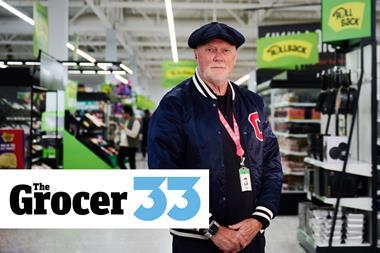
Aldi’s like-for-like sales were down in 2024, the discounter’s chief executive has admitted, blaming investment in expansion and lowering prices.
Aldi’s total sales were up 1.1% to £1.81bn in the year to 31 December 2024 – an uptick more than accounted for by the roughly 30 new stores it opened in the period, taking its estate to about 1,040. It means sales in existing stores fell.
“Our like-for-like sales were down,” said Aldi UK & Ireland CEO Giles Hurley.
“That is a reflection of two things. First of all, the fact we invested in retail prices, which does have a significant impact on like-for-likes, particularly with the inflationary year that preceded it.
“And the second thing I would say is that with our ambition around growth and scale, it is inevitable that our like-for-likes will get affected.
“We are bringing our offer not only to new catchments, but also in existing towns and cities we’re bringing additional stores.”
Hurley also blamed Aldi’s behind-the-market growth on tough comparatives in 2023, when its sales rose by 16%.
“We’re up against some pretty strong figures,” he said as he announced Aldi’s latest full-year results this morning. “You’ve got to remember as well that in 2024, there was some considerable investment in retail prices.
“In 2023 we did see inflation across the market and we invested heavily in 2024 in prices to ensure that we continue to be the best value in the market.”
Aldi – which does not usually comment on like-for-like sales – has recovered some momentum in 2025, with its sales up 4.8% year on year in the 12 weeks to 10 August, according to Worldpanel by Numerator (formerly Kantar). Aldi’s market share stands at 10.8%, unchanged since a year earlier.
Its operating profit also dipped sharply in 2024, by 21% to £435.5m, with the supermarket blaming continued investment in lowering prices as well as infrastructure and pay rises for staff.
The discounter plans to invest £1.6bn in opening 80 new stores over the next two years, which Hurley said would drive future market share growth.
“I have a long-term vision where we bring 400 more stores to the UK, bringing our offer to communities across the UK who currently can’t access affordable groceries,” said Hurley.
“So, if you think that next year we will surpass 1,100 stores, that gives you an indication that our growth should mean that our share grows.”
Hurley said inflation was putting pressure on families, and warned the government against piling more costs on retailers, including through planned business rates reforms.
“I think it’s fair to say inflationary pressures are making it really challenging for families across the UK, and I think shoppers are responding by shopping around and prioritising value,” he said.
“And that’s definitely been driving our growth. That’s why we’ve invested over £300m in price reductions, trying to offset some of those inflationary pressures that shoppers are facing.
He said “domestic policies” in the UK had added to cost pressures on businesses from “global factors”.
“We need domestic policy which challenges that stubborn inflation that we’re seeing at the moment,” he added. “Therefore, we would encourage the government to adopt policies which don’t inadvertently add to the operating costs of businesses in the food sector.”
Hurley also called for more investment in British farming, echoing a similar call from M&S last week. “Well over 75% of what we sell comes from British manufacturers, British suppliers and British primary producers,” Hurley said.
“We know that an investment in British agriculture can ensure that our food sector is resilient and secure. And the two are linked, hand in hand. You can’t have a resilient food sector without a resilient and secure farming sector.
“So without doubt, we need investment to expand and extend food production capacity. That means we don’t have to rely on what can be more volatile imports.
“Ultimately, that investment will play into price on the shelves in the long term.”



















No comments yet